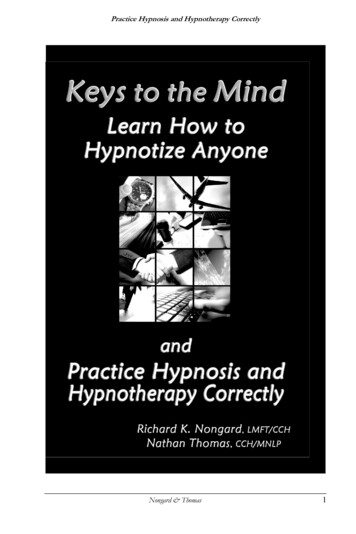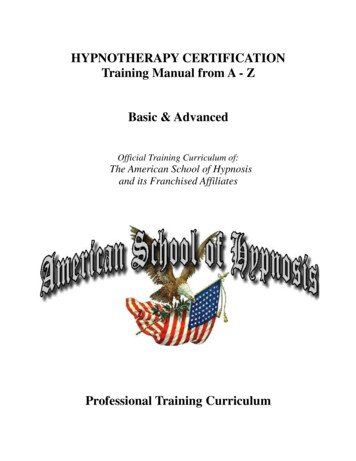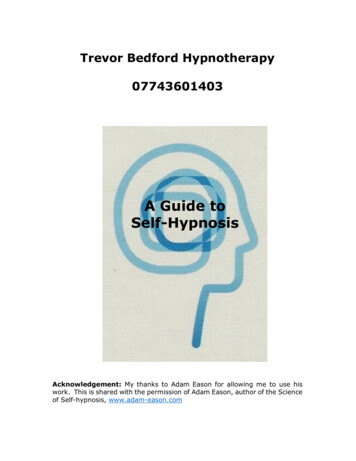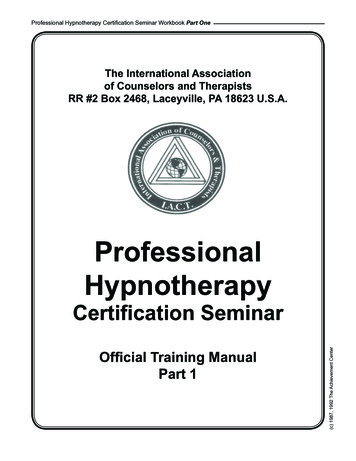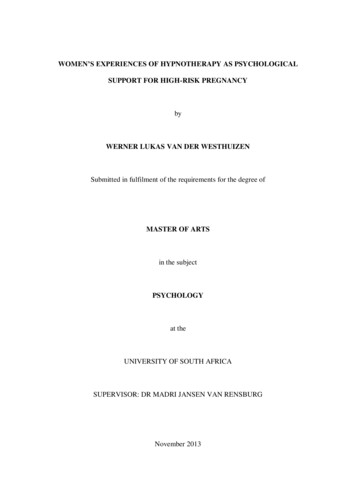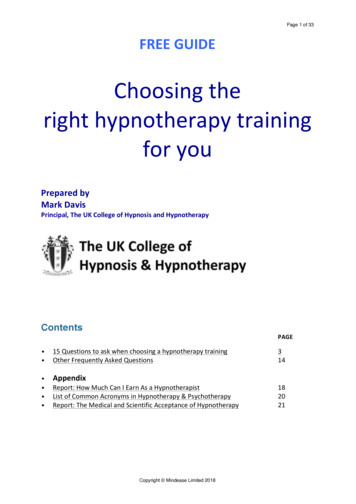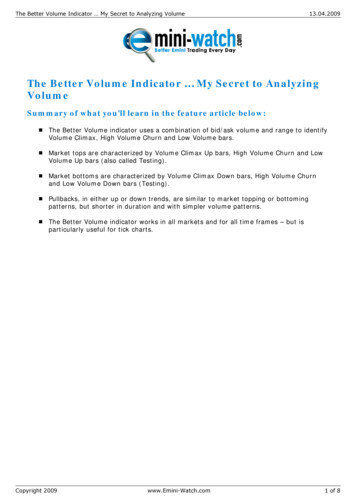
Transcription
Hypnotherapy ScriptsVolume IDr. Steve G. Jones, Ed.D.Clinical Hypnotherapistwww.SteveGJones.com
Research Assistant: Katherine T. SinclairCopyright 2007All rights reserved. No material in this book may be reproduced or utilized in any form orby any means, electronic or mechanical, including photocopying, recording, or by anyinformation storage and retrieval system, without permission from the author.
Hypnotherapy Scripts Volume ITable of ContentsForeword. 7Chapter 1: What is a Script? . 9Chapter 2: Weight loss Scripts . 19Weight Loss . 20Body Image . 21Decreasing Food Intake . 22Exercise . 24Raising Your Metabolism . 26Weight Control . 29Chapter 3: General Wellness Scripts . 32Overcoming Anxiety . 33Eating Healthy . 35Finding Love . 37Financial Success . 38Memory . 39Relaxation . 41Control Alcohol Consumption . 43Nurture and Empower Yourself (for Children) . 45Avoid Overanalyzing . 47Stress Reduction . 49Control Anger . 51Improve the World around You . 53Proper Rest for Skin . 55Creativity . 57Improve Writing Ability . 59Proper Skin Care . 61Chapter 4: Confidence Scripts. 64Steve G. Jones, Ed.D. - Page 5
Hypnotherapy Scripts Volume IDating . 65Freedom to Fly on Airplanes. 67Overcome fear of Public Speaking . 69Self Esteem . 71Chapter 5: Motivation Scripts . 74Endurance . 75Focus . 77Motivation for Success . 79Becoming Successful . 82Chapter 6: Medical Issue Scripts. 84Control Coffee Intake . 85Pain Management . 87Overcome Sadness. 89Overcome Depression . 90Freedom from Panic Attacks . 92Stop Smoking . 94Sleep. 96Positive Thoughts for Skin . 98Positive Thoughts for Skin Part II. 100Overcome Trauma . 102Overcome OCD (Obsessive Compulsive Disorder) . 104Chapter 7: Dental Issue Scripts . 106Dental Hygiene . 107Stop Teeth Grinding . 108References . 110Resources . 111Books by Steve G. Jones, Ed.D. . 112Steve G. Jones, Ed.D. - Page 6
Hypnotherapy Scripts Volume IForewordHypnotherapy has been used in dental practice since the 19th century. It wasused then in the form of hypnoanalgesia during surgical dental intervention.The first tooth extraction with the use of hypnoanalgesia was performed byJean Victor Dudet in 1830.Since then, hypnotherapists have made powerful strides toward changingpublic perception about hypnosis. Doctors continue to use hypnosis to calmtheir patients, and to ease pain during procedures (Bierman, 1995). Theyregularly tell patients how easy recovery will be. Additionally, doctors tellpatients that a procedure is common and meets with a high degree ofsuccess. Because these phrases are delivered by an authority figure, they actin exactly the same way as hypnotic suggestions, and become reality for thepatient. More obvious hypnotic suggestions are also sometimes given topatients by doctors trained in hypnosis, and for over a century, dentists haveused hypnosis to ease discomfort during dental procedures.In addition to using hypnotic techniques themselves, doctors and dentistsregularly refer patients to hypnotherapists for help with weight loss, smokingcessation, and overcoming fears about dental and surgical procedures.Before the 1950s, the medical profession scoffed at hypnotherapy, but todayit is being readily embraced as a complement to long-standing medicalprocedures.Steve G. Jones, Ed.D. - Page 7
Hypnotherapy Scripts Volume IAccording to the southern Medical Journal (2004), as many as 40% ofAmericans use some form of complementary and alternative medicine suchas hypnotherapy. At no other time has the world of hypnotherapy been aswide open with exciting possibilities as it is now. Because more and morepeople are exploring and accepting the benefits of hypnotherapy, a muchgreater need for qualified hypnotherapists to open practices now exists. Thegoal of this book is to give you, a potential or practicing hypnotherapist, astrong base for building your practice. You will be guided through a basichypnotherapy session, and you will be given homework opportunities to useand modify your techniques so that you can help others lose weight, findlove, and increase their financial success, among other issues.For the latest information about the hypnotherapy world, visitwww.americanallianceofhypnotists.org, the website of the AmericanAlliance of Hypnotists, of which I am the founder and director. Theorganization started in America as a network of hypnotherapists, but it isnow open to practitioners worldwide. Among other things, this site listshypnotherapists and classes available in your local area. Become a member.It’s free. You can also visit my website, www.SteveGJones.com, to learnmore about hypnosis.Steve G. Jones, Ed.D. - Page 8
Hypnotherapy Scripts Volume IChapter 1: What is a Script?Steve G. Jones, Ed.D. - Page 9
Hypnotherapy Scripts Volume IPerhaps the most important part of any hypnosis experience, and thereforethe most important chapter of this book, is the script.What is a script? A script is the meat of the hypnosis experience. It is wherethe therapy occurs. If you do not have a script, you are not doinghypnotherapy. You may be hypnotizing your client, but you are not helpinganyone. A script is the portion of the hypnosis session during which yousuggest change. It delivers the main message to the subconscious mind. Thepretalk, induction and deepening were all to prepare the client for the script.A script can be on anything: attracting romantic partners, improvingefficiency for increased financial success, weight loss, memoryimprovement, smoking cessation, improved confidence, or whatever theclient’s challenge may be.As part of a self-hypnotherapy session, a hypnotherapist could even write ascript to enhance her creativity—to suggest to her subconscious mind thatshe is going to write more creative scripts.The script is where you form new associations for the client. Instead ofbeing afraid, the client will associate a pleasant feeling with talking tomembers of the opposite sex, eating health foods, going down an escalator,down an elevator, into a crowd of people, up on a stage, in an airplane, neara snake.Steve G. Jones, Ed.D. - Page 10
Hypnotherapy Scripts Volume II have a prospective client who is afraid of entering parking garages. Duringthe script, she will be given a new association for entering a parking garage,and she will no longer be afraid. Her old association, the one she has now, isscary for her. The script will plant positive suggestions that her body willremember in the future when she actually enters a parking garage.If you are new to hypnotherapy, you might want to start with a script writtenby someone else. You can borrow one of my scripts, or a script from one ofthe countless books available on this topic (see chapter’s end forrecommended resources).When using a script that someone else has written, make sure that you haveread through it before the hypnosis session. The worst thing you canpossibly do is go into a session without previously having read through thescript.You want to be familiar with the script for several reasons. First of all, youdo not want to trip through words and concepts while reading the scriptduring the session. (Because your client’s eyes are covered, you can read ascript during a session. You do not have to memorize it.)Second of all, you need to evaluate the script prior to reading it to yourclient. Each client is different, so you will need to find and eliminate thosethings in the script that are not going to apply to the particular client forSteve G. Jones, Ed.D. - Page 11
Hypnotherapy Scripts Volume Iwhom the script is being used. You need to have a full understanding of thescript so that you can tailor it to reach the best possible results.Do your due diligence. Do not allow yourself any excuses. Prepare everytime.Beware of procrastinating and ending up in a situation that causes you tostumble. You can get lazy. You can get into a rut. During a live sermon, thepreacher can say, “I am sorry. I made a mistake. Let me backtrack.” Youcannot do that under hypnosis. Every word you say goes into the patient’ssubconscious mind.Be prepared. You are dealing with the most precious part of a human: Hismind. Treat it deli
Improve Writing Ability . in exactly the same way as hypnotic suggestions, and become reality for the patient. More obvious hypnotic suggestions are also sometimes given to patients by doctors trained in hypnosis, and for over a century, dentists have used hypnosis to ease discomfort during dental procedures. In addition to using hypnotic techniques themselves, doctors and dentists regularly .




